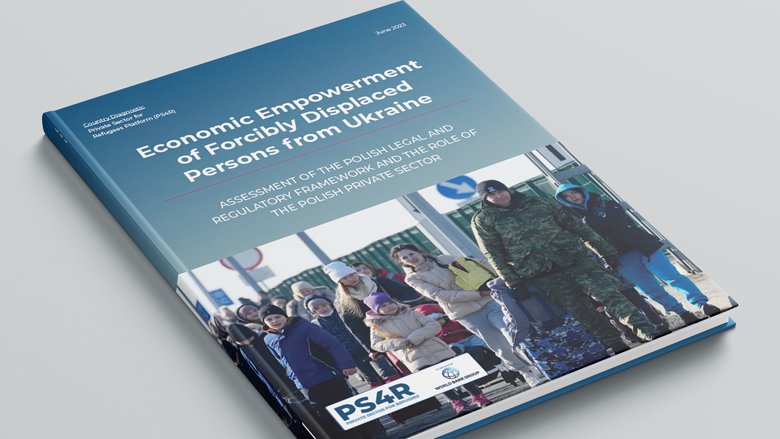The Backdrop: Poland��s Strong Support for the Forcibly Displaced
In the wake of the Russia��s invasion of Ukraine, more than 4 million Ukrainian residents headed to Poland for refuge. The work of the Polish government and elements of the private sector��and the Polish people��toward economically and socially integrating these forcibly displaced people (FDPs) has been exemplary. This work was, of course, complemented by swift and effective action by aid agencies like UNHCR and the IOM.
Poland has done an exceptional job of ensuring that these forcibly displaced people can legalize their status. That means access to employment, education, healthcare, and other social welfare programs. Financial institutions stepped in to provide access to bank accounts, e-banking services, and payment cards so that all the social benefits and cash payments could be safely received and used for the immediate needs of the FDPs. The conversion of Hryvnia (Ukrainian currency) into Zloty (Polish currency) was facilitated by an agreement between the central banks of Poland and Ukraine.
Now our attention turns to the longer-term well-being of the forcibly displaced and their host communities. As many of the FDPs from Ukraine will stay longer, if not permanently, in Poland, the authorities make plans for their social, professional, and economic integration to facilitate their resilience and independence from welfare and social benefits��and to empower them fully to help develop the economies of their host communities.
Toward Sustainability: Action Steps for Government and the Private Sector
Private Sector for Refugees (PS4R), an initiative coordinated by the World Bank, conducted an analysis of the environment for longer-term integration of FDPs from Ukraine in Poland and made recommendations for government and private sector action needed for effective action. Released in May 2023, the analysis, Economic Empowerment for Forcibly Displaced Persons in Ukraine: Assessment of the Polish Legal and Regulatory Framework and the Role of the Polish Private Sector is rooted in the refugee and business context of Poland, and integrates PS4R��s experience with high-intensity FDP situations in other parts of the world. It has been provided to the Polish government in June 2023 and the technical advice is being taken into account by the Polish authorities in designing their longer-term response planning.
The report argues that the earlier FDPs from Ukraine are integrated into the Polish economy, the earlier they will integrate into Polish society more broadly and support the development of local communities with their skills, talents, and entrepreneurial activities. With the right regulatory incentives, local practices, and support from the private sector, FDPs from Ukraine can be employers, enrich the workforce, invest, and become new markets for products and services.
Among the key findings, some areas are identified as public and/or private sector recommendations.
Recommendations for consideration by the public sector:
- Sustain social and regulatory support: Secure long-term budgets and expand assistance areas while supporting NGOs that promote social inclusion. Fast-track diploma recognition, driving licenses, and access to financial services for a seamless integration experience.
- Grant rights to third-country nationals: Amend the Act on Assistance to Ukrainian Refugees to provide equal rights and access to necessary documents for foreigners fleeing the conflict.
- Support refugee entrepreneurship: Offer business training, simplify registration processes, and provide startup grants to empower refugees to establish their own businesses and contribute to economic growth.
- Strengthen local government support: Provide budgetary support to local governments for entrepreneurship and business services, establishing centers for mentoring and cultural integration across the country.
- Tap into the diaspora's potential: Facilitate foreign investments from Ukrainians abroad, leveraging the Ukrainian diaspora's economic ties and expertise for regional growth.
Recommendations for consideration by the private sector:
- Enhance employability and access to work: Invest in Polish language courses, childcare facilities, and provide job search support and technical training to boost labor market participation.
- Foster social dialogue amongst employers: Raise awareness among businesses about the benefits of hiring refugees and offer financial incentives to drive engagement, creating a win-win situation.
- Leverage the existing entrepreneurship ecosystem: Utilize established Polish entrepreneurship programs to provide support and guidance to refugee entrepreneurs through peer networks and mentorship.
- Encourage investments in refugee-related businesses: Collaborate with investment funds, banks, and businesses to attract capital and promote technological innovation in refugee-related sectors.
- Unite under a "business compact": Bring together businesses, governments, NGOs, and donors to pool resources and create a coordinated mechanism for sustainable economic integration. By working together, we can unlock the true potential of Ukrainian refugees and drive economic development.
By implementing these 10 recommendations, the public and private sector of Poland can partner to keep fostering the sustainable economic integration of refugees from Ukraine, benefiting both the refugees and the local economy. It will not only enhance the social cohesion of the host community but also contribute to the overall economic growth and stability of the country, while paving the way for economic development and future collaboration between Poland and Ukraine.
